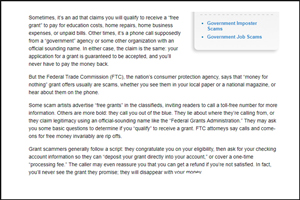Government Agency Scams
A scam is a fraudulent scheme carried out by a dishonest individual, group, or company in an attempt to obtain money or something else of value. Scams have traditionally taken the form of confidence tricks, where an individual presents themselves as someone with skill or authority—such as a doctor, lawyer, or investor. After the internet became widely used, new forms of scams emerged, such as lottery scams, phishing, email spoofing, and more. Government agency scams have also become prevalent in recent times.
Government agency scams involve deceptive practices where individuals or entities falsely claim to represent government bodies. Scammers impersonate officials, often using threats or intimidation to coerce victims. They may demand immediate payments for fake taxes, grants, or benefits, exploiting individuals through phishing emails or calls to obtain sensitive information. Legitimate government agencies do not typically communicate urgent matters through unsolicited means or demand immediate payments. To protect against such scams, verify the identity of anyone claiming to represent a government agency, use official contact details, be skeptical of threats, avoid immediate payments, and refrain from sharing sensitive personal information. Staying informed about common scam tactics and promoting awareness is crucial in mitigating the risks associated with government agency scams.
How government agency scam operates:
Government agency scams occur when fraudsters send official-looking letters or emails to request money or personal information. The correspondence is designed to appear as if it comes from a government department and implies that the sender has some form of authority. The letter or email might advise you to register—often for a fee—in order to comply with certain legislation. Other variations include demands for payment of fines for alleged legal breaches or requests for bank details to process a fake tax rebate.
Government agency scams typically operate through deceptive tactics, where fraudsters impersonate officials to exploit individuals. These scams often begin with unsolicited communication—such as phone calls or emails—claiming to represent a government agency. Scammers use intimidation, threats of legal action, or promises of benefits to manipulate victims. They may demand immediate payments for fake taxes, services, or penalties, often insisting on untraceable methods like prepaid cards or wire transfers.
Victims are coerced into providing sensitive personal information, such as Social Security numbers or financial details, under the pretense of resolving urgent issues. To perpetuate the deception, scammers create a sense of urgency, making it difficult for victims to verify the legitimacy of the communication.
Awareness, skepticism, and verifying the identity of supposed government representatives are crucial to thwarting these scams and protecting against financial and personal harm.
The North Pole and South Pole of government agency scams
Every day, technology is helping scammers become more convincing in making their victims believe they are calling from a legitimate government agency. However, there are ways to determine whether these agencies are real or fake. Highly skilled scammers can even manipulate caller ID to display the actual phone number of a government agency. While their goal remains the same—to steal your money—the two main types of government imposter scams are as different as the North Pole and the South Pole, or day and night. One claims you owe money to the government, while the other claims the government owes money to you.
In the most common scam scenario, the government imposter claims that you owe taxes or another unpaid debt to a government agency. They often issue a warning that if you don’t pay immediately, you will be arrested. This is something a legitimate government agency would never do. No real government agency will ask you to settle a debt over the phone. The first step they typically take is to contact you through official postal mail—not by telephone.
According to the legitimate Federal Trade Commission (FTC), there are three important things to remember to protect yourself from falling victim to a government agency scam.
-
It should always be kept in mind that no real federal government agency or its employees will ask people to send money for unpaid debts or prizes. Secondly, they will never ask you to wire money, provide your bank account details or card numbers, or use a prepaid debit card to pay for anything. Caller ID does not protect you. There are technologies that allow scammers to make caller ID display false or misleading information.
While most people are aware of these scams, scammers continue to use sophisticated tactics to steal money and personal information. We must stay alert and avoid falling prey to their tricks. The best way to protect yourself is by calling the customer service number on the back of your card and speaking directly with the official security team. Another effective approach is to talk about the suspicious call with others. By spreading awareness through word of mouth, you might help someone you care about avoid becoming a victim of a scam.







